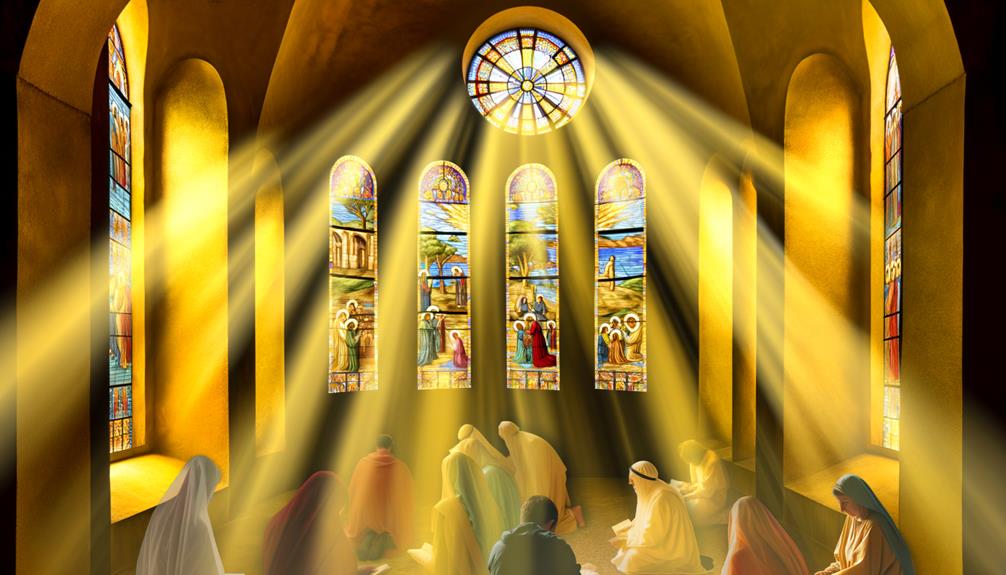God Meaning in the Bible: Creator and Sustainer!
The Bible presents a multifaceted portrayal of God, who is both the Creator and Sustainer of the universe (Genesis 1:1; Colossians 1:17). God embodies a covenantal relationship marked by unconditional love and faithfulness, offering solace and hope through divine promises.
As Judge, God enforces moral order and accountability, while as Redeemer, He offers salvation and restoration (Isaiah 44:22; John 3:16). This divine entity fosters a personal connection with believers, guiding them through prayer and nurturing spiritual growth.
Through these roles, God profoundly influences believers’ moral decisions and sense of purpose, laying the groundwork for further exploration of this intricate subject.

Key Takeaways
- God is the Creator and Sustainer of the universe, maintaining order and providing for all living creatures (Genesis 1:1, Psalm 104).
- Divine covenants illustrate God’s unending commitment, love, and promise of redemption (Jeremiah 31:31-34).
- God serves as both Judge and Redeemer, balancing justice with grace to offer salvation (Isaiah 44:22, John 3:16).
- A personal relationship with God is fostered through prayer, trust, and spiritual growth (Psalm 145:18).
The Meaning of God in the Bible: Creator, Protector, and Savior
| Aspect | Biblical Reference | Explanation |
|---|---|---|
| Creator of All Things | Genesis 1:1 | “In the beginning, God created the heavens and the earth.” God is the origin of all creation. |
| Omnipotent and Sovereign | Isaiah 45:5 | “I am the Lord, and there is no other; apart from me there is no God.” God is all-powerful and sovereign over everything. |
| Loving and Merciful | 1 John 4:8 | “Whoever does not love does not know God, because God is love.” God’s nature is defined by His love for humanity. |
| Holy and Just | Psalm 99:9 | “Exalt the Lord our God… for the Lord our God is holy.” God is perfect in His holiness and righteousness. |
| Eternal and Unchanging | Hebrews 13:8 | “Jesus Christ is the same yesterday and today and forever.” God’s nature is eternal and unchanging. |
| Provider and Protector | Psalm 23:1 | “The Lord is my shepherd, I lack nothing.” God provides for and watches over His people. |
| Savior and Redeemer | John 3:16 | “For God so loved the world that He gave His one and only Son.” God’s ultimate act of love is in providing salvation through Jesus Christ. |
Creator and Sustainer

In what ways does the Bible depict God as the Creator and Sustainer of all existence?
The Bible presents God as the primeval architect and continuous nurturer of the cosmos. Genesis 1:1 explicitly states, ‘In the beginning, God created the heavens and the earth,’ attributing the inception of all matter and life to divine agency.
Beyond creation, God’s sustaining role is evident in passages like Colossians 1:17, which asserts, ‘in him all things hold together.’ This theological framework posits that God’s omnipotence and omnipresence are not only foundational but persist in maintaining the universe’s order and function.
The Psalms, particularly Psalm 104, poetically describe God’s ongoing provision and care for all living creatures, reinforcing His dual role as both Creator and Sustainer.
Covenant and Promise

The concept of covenant and promise in the Bible serves as a foundational theme, illustrating God’s commitment to His people through binding agreements and assurances.
These divine covenants, ranging from Noah to Abraham and Moses, symbolize a perpetual relationship marked by love, faithfulness, and divine favor. They underscore the fortitude and unwavering nature of God’s promises, evoking a deep sense of hope and trust.
- Unconditional love: God’s covenants reflect His steadfast love.
- Faith in adversity: Promises provide solace during trials.
- Eternal assurance: Covenants signify unending divine commitment.
- Hope for redemption: Promises point to future salvation.
These elements collectively highlight the profound spiritual and relational dimensions of God’s covenantal promises.
Judge and Redeemer

God’s dual role as both Judge and Redeemer in the Bible underscores the complexity of divine justice and mercy, revealing a multifaceted relationship between humanity and the divine.
As Judge, God enforces moral order, holding individuals and nations accountable for their actions, as seen in passages like Deuteronomy 32:4 and Psalm 7:11.
Conversely, as Redeemer, God offers salvation and restoration, epitomized in Isaiah 44:22 and John 3:16.
This duality illustrates a balance between justice and grace, where divine judgment is not merely punitive but aims at ultimate redemption.
Personal Relationship

While God’s roles as Judge and Redeemer highlight His interaction with humanity on a macro level, the concept of a personal relationship with God brings this interaction into the intimate, individual sphere. This relationship is characterized by a profound sense of closeness and mutual engagement, as seen in various biblical narratives and teachings.
Key elements include:
- Intimacy: Experiencing God’s presence in daily life.
- Communication: Engaging in prayer and listening for divine guidance.
- Trust: Relying on God’s wisdom and timing.
- Love: Feeling and reciprocating divine love.
These aspects underscore the Bible’s representation of God not just as a distant deity, but as a personal companion and guide.
Influence on Believers

Understanding how biblical teachings shape the lives and perspectives of believers reveals the profound and multifaceted influence of God in their daily experiences. The Bible serves as a foundational text, guiding moral decisions, fostering spiritual growth, and providing a sense of purpose. This influence permeates various aspects of life, as illustrated below:
| Aspect of Life | Biblical Influence | Example Scripture |
|---|---|---|
| Moral Decisions | Ethical guidelines and commandments | Exodus 20:1-17 |
| Spiritual Growth | Encouragement in faith and perseverance | Hebrews 11:1 |
| Sense of Purpose | Understanding of divine calling and mission | Jeremiah 29:11 |
| Community Engagement | Commands to love and serve others | Matthew 22:39 |
Such teachings reinforce a worldview where divine principles imbue daily actions and communal interactions.
Conclusion
The biblical portrayal of God juxtaposes divine omnipotence with intimate relationality.
As Creator and Sustainer, God exhibits unparalleled sovereignty, yet through covenants and promises, manifests a commitment to human partnership. Understanding perseverance in the Bible reveals the ongoing faithfulness of God towards His people, despite their shortcomings and failures. This partnership with God is characterized by perseverance and a mutual dedication to the covenant relationship. As believers, we are called to respond to God’s commitment with our own perseverance, trusting in His faithfulness and remaining steadfast in our own faith.
Functioning as both Judge and Redeemer, divine justice intertwines with mercy.
This duality fosters a profound personal relationship, wherein believers find both awe and solace.
Consequently, the influence on believers is not merely doctrinal but transformative, shaping ethical conduct and spiritual devotion in a dynamic interplay of reverence and love.






